Dady Surname Ancestry ResultsOur indexes 1000-1999 include entries for the spelling 'dady'. In the period you have requested, we have the following 38 records (displaying 21 to 30): Single Surname Subscription | | | Buying all 38 results of this search individually would cost £216.00. But you can have free access to all 38 records for a year, to view, to save and print, for £100. Save £116.00. More... |
These sample scans are from the original record. You will get scans of the full pages or articles where the surname you searched for has been found. Your web browser may prevent the sample windows from opening; in this case please change your browser settings to allow pop-up windows from this site. Voters in the Western Division of Norfolk, for the parish of Waborne
(1837)
Under the Reform Act of 1832, the County of Norfolk was allotted four Members of Parliament, being two Knights of the Shire for the Eastern Division and two for the Western. The Western Division included the hundreds of Brothercross, Clackclose, Freebridge Lynn, Freebridge Marshland, Gallow, North Greenhoe, South Greenhow, Grimshoe, Guiltcross, Holt, Launditch, Mitford, Shropham, Smithdon and Wayland. Polling in 1837 took place at Swaffham, Downham, Fakenham, Lynn Regis, Thetford and East Dereham. The franchise was available to freeholders worth 40s a year or over; copyholders and long leaseholders of £10 or more; short leaseholders and tenants of £50 or more: but limited to adult males. Voting took place on 1 and 2 August 1837. This poll book lists the voters for each parish, with the votes cast. Each voter had two votes: the votes are indicated in the columns F. (Sir William Henry Browne Folkes, 2838); A. (Sir Jacob Astley, 2713); B. (William Bagge, 3178); and C. (William Lyde Wiggett Chute, 2877). The voters were not necessarily resident in the parish, but derived their franchise from the land there; so some of the names have addresses outside the parish, not a few living in different counties. Not everyone voted, but everyone with a vote was listed in the poll book: persons who qualified for voting in two parishes (but nevertheless had just the one vote per person) are noted as such.DADY. Cost: £6.00.  | Sample scan, click to enlarge
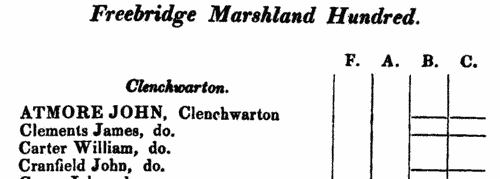
| Electors of Weybourne
(1840)
The register of electors entitled to vote in any parliamentary election for West Norfolk between 1 November 1840 and 1 November 1841 lists 7,620 freeholders arranged by hundred and within hundred by parish or township &c. In the first column, after number within the register, the elector's name is given (surname first); the second column gives place of abode; the third column the nature of qualification (such as 'owner and occupier'); and the fourth column the address of the qualifying property, in some cases with the name of the tenant or occupier.DADY. Cost: £4.00.  | Sample scan, click to enlarge

| North Lincolnshire Voters: Welton (by Lincoln)
(1852)
The Poll Book for North Lincolnshire (Lindsey) in the General Election of 1852 was prepared from the poll clerks' lists, and so is arranged polling district by polling district, and within those by township or parish, but with non-voters listed separately at the end of each polling district. The 9,620 voters are listed not by residence, but by the parish or township in which lay the property that gave the right to vote: consequently 260 electors appear twice on the register. 1,797 did not vote. Many of the electors lived outside the area, or even outside the county. The names are listed roughly alphabetically by surname, with christian name, residence and occupation: with a key to the nature of their property (freehold fr, rented rt, or copyhold ch), and for whom the votes were cast (CR.: Rt. Hon. R. A. Christopher, who received 5,585 votes; CH.: Sir Montague J. Cholmeley, 4,777; S.: James Banks Stanhope, 5,575). Each elector had two votes. The franchise comprised all adult males in possession of 40s freehold, or £10 copyhold or leasehold, annual value. DADY. Cost: £6.00.  | Sample scan, click to enlarge
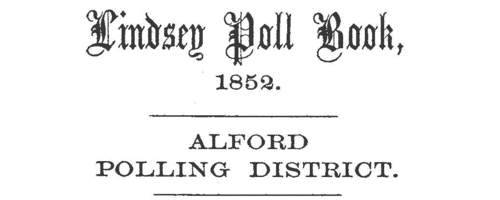
|  Sailors and marines on board Her Majesty's ship Assistance
(1856-1860) Sailors and marines on board Her Majesty's ship Assistance
(1856-1860)
The China Medal was awarded to soldiers and sailors involved in the various actions of the war against China, in which this ship was engaged from 1856 to 1860. The medals were either delivered on board or sent on in 1862: except that many of the men were no longer immediately traceable, and the remarks on the roll show that some medals were not sent on for several years, and some were never sent. After the main roll there is a section showing which of the men also qualified for clasps. Separate clasps were awarded for men who had been in receipt of the China Medal of 1842; for the taking of Fatshan in 1857, Canton in 1857, Taku Forts in 1858, Taku Forts in 1860, and Pekin in 1860. Most of the men on this ship are shown as having been given the Canton clasp, for being actually present at Canton on 28 and 29 December 1857, when that city was bombarded and finally captured.DADY. Cost: £8.00.  | Sample scan, click to enlarge

| Debtors
(1881)
County Court Judgments in England and WalesDADY. Cost: £6.00.  | Sample scan, click to enlarge

| Residents of Southport, Lancashire
(1883)
Slater's Royal National Directory of Southport and Birkdale with their Vicinities of 1883-4 includes this general alphabetical listing of residents and traders.DADY. Cost: £4.00.  | Sample scan, click to enlarge
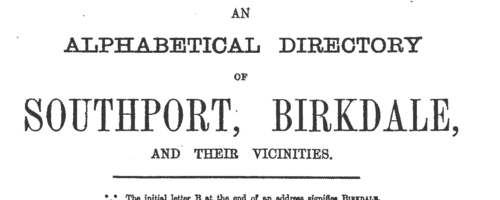
| Boys entering Gresham's School
(1885)
The Sir John Gresham Grammar School at Holt in Norfolk was founded by sir John, who bought the manor house there in 1546 to convert it into a school, and building work had started by 1555. To celebrate the quatercentenary in 1955, a history of the school written by the Reverend C. L. S. Linnell was published, together with an Alumni Greshamienses, a register of boys entering the school from 1562 to 1954, compiled by A. B. Douglas. The materials to hand for the register for the early years were slight; the first coherent lists of boys survive only from 1729, and then are fitful, with little detail, and largely missing from 1784 to 1803; however, from 1810 onwards the names of boys' parents are usually recorded. The register is arranged chronologically by year (and from 1900 by term - L, Lent; M, Michaelmas; S, Summer), and then alphabetically by surname (in capitals) and christian name(s). Where known, year of birth is then given (in brackets), names, addresses and occupations of parents. From 1900 onwards there are italic abbreviations for sporting achievements at school (h, hockey colours; VIII, shooting colours; S, first-class swimmer; XI, cricket colours; XV, football colours), and p for house prefect and P for school prefect; then (in italics) information about the boy's adult life, and his address (where living) at the time of publication. Finally, on the right hand side of the page, in italics, is given the year of his leaving the school. Most detail is absent before 1810; and, of course, for the boys still at school in 1955, or only recently left, there are no details of future career; nor are there the usual details about their parentage. From 1898 onwards day boys are noted with an italic D (N means Newquay dayboy); and from 1900 onwards the school houses are shown (B, Bengal Lodge; F, Farfield; H, School House or Howson's; K, Kenwyn; O, Old School House; W, Woodlands); and, for the junior school, c, Crossways; k, Kenwyn; o, Old School House).DADY. Cost: £4.00.  | Sample scan, click to enlarge
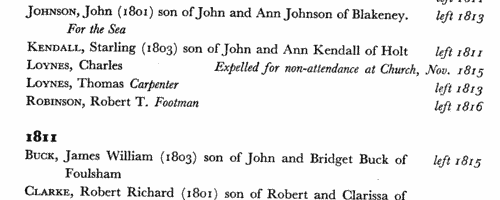
| Steam Engine Makers in England
(1898)
The report of the Steam Engine Makers Society includes accounts of disbursements by all their branches (mostly in England), covering members' sickness, travel and funeral expenses.DADY. Cost: £6.00.  | Sample scan, click to enlarge
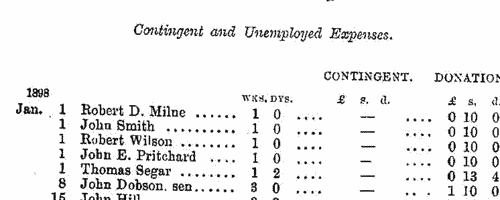
| Missing Next-of-Kin and Heirs-at-Law
(1900)
The Unclaimed Money Registry and Next-of-Kin Advertisement Office of F. H. Dougal & Co., on the Strand in London, published a comprehensive 'Index to Advertisements for Next of Kin, Heirs at Law, Legatees, &c., &c., who have been Advertised for to Claim Money and Property in Great Britain and all Parts of the World; also Annuitants, Shareholders, Intestates, Testators, Missing Friends, Creditors or their Representatives, Claimants, Unclaimed and Reclaimed Dividends and Stock, Citations, Administrations, Rewards for Certificates, Wills, Advertisements, &c., Claims, Unclaimed Balances, Packages, Addresses, Parish Clerks' Notices, Foreign Intestates, &c., &c.' The original list was compiled about 1880, but from materials dating back even into the 18th century: most of the references belong to 1850 to 1880. For each entry only a name is given, sometimes with a placename added in brackets: there may be a reference number, but there is no key by which the original advertisement may be traced. The enquirer of the time had to remit £1 for a 'Full and Authentic Copy of the Original Advertisement, together with name and date of newspaper in which the same appeared'. This appendix to the list was issued in about 1900.DADY. Cost: £4.00.  | Sample scan, click to enlarge
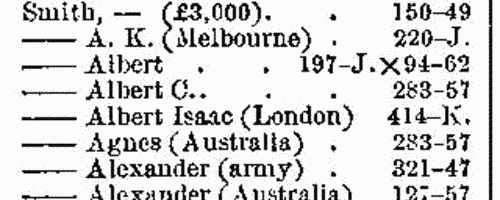
|  Outstanding soldiers of the Royal Munster Fusiliers
(1881-1901) Outstanding soldiers of the Royal Munster Fusiliers
(1881-1901)
Each year the best soldiers of the regiment were chosen for long service and good conduct medals. This register gives rank, name, regimental number, and date of recommendation. (The sample scan is from the East Surrey regiment). The register is essentially a register of recommendations, annotated with details of the issue of the medals. Where no gratuity accompanied the medal, the entry is marked 'W. G.' (without gratuity); where, for one reason or another, the medal was not issued, the entry is marked 'N. S.' (not sanctioned) and struck through. The regiment was based on the 101st Regimental District - Tralee. The 1st battalion returned from Nova Scotia in 1883, and by 1885 was stationed at Pembroke Dock; it was moved to Ireland in 1891, and in 1895 it was at the Curragh. The 1st battalion was sent to South Africa in 1899, gaining the honour "South Africa, 1899-1902". The 2nd battalion embarked for Malta in 1882, and went on to India: it was stationed at Kamptee in Madras in 1885. By 1895 it was at Cawnpore in Bengal, having served in Burmah and added "Burmah, 1885-1887" to the colours.DADY. Cost: £8.00.  | Sample scan, click to enlarge
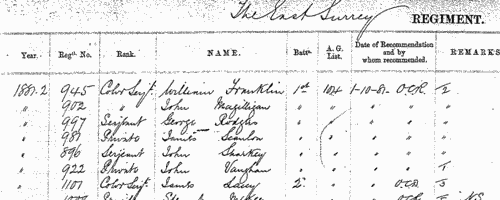
|
Research your ancestry, family history, genealogy and one-name study by direct access to original records and archives indexed by surname.
|













